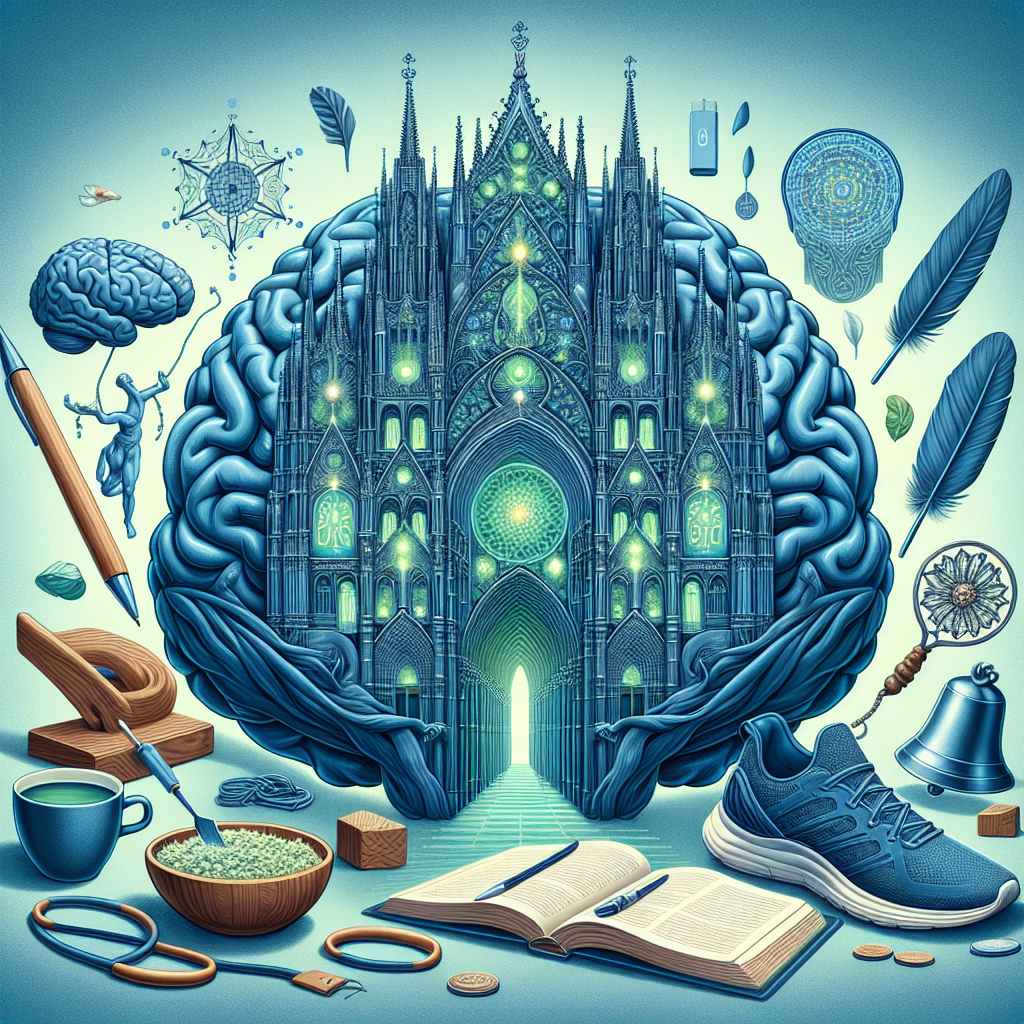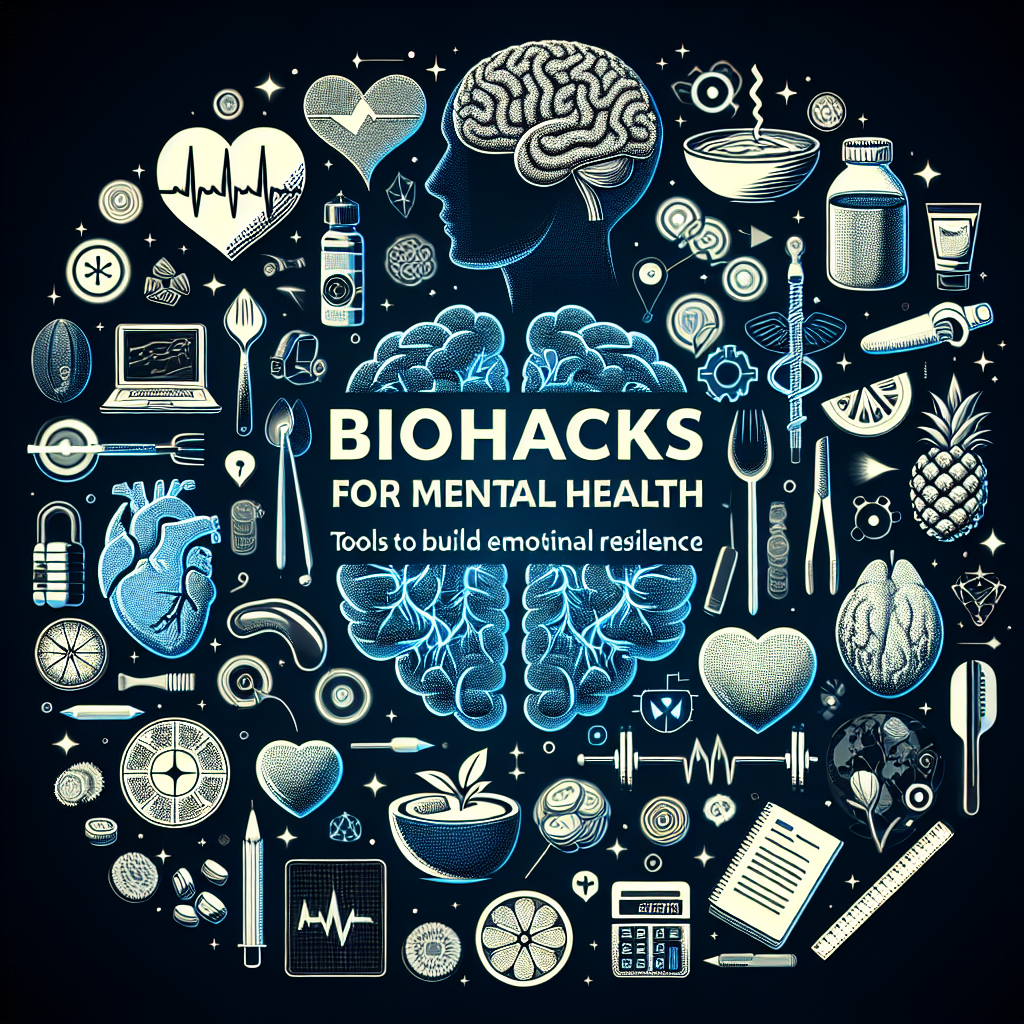Biohacks for Mental Health: Tools to Build Emotional Resilience

Discover the power of Biohacks for Mental Health and learn how to build your emotional resilience. Start your journey towards a healthier mind today. Click here to get started.
Exploring Biohacks for Mental Health: Techniques to Enhance Emotional Resilience
Biohacking, a term that has gained significant traction in recent years, refers to the practice of using science and self-experimentation to take control of one’s own biology. While it is often associated with physical health and performance, biohacking can also be applied to mental health. This article explores various biohacks for mental health, specifically focusing on techniques to enhance emotional resilience.
Emotional resilience is the ability to adapt to stressful situations or crises. It’s the mental reservoir of strength that we’re able to call on in times of need to carry us through without falling apart. By building emotional resilience, we can better manage stress and feelings of anxiety and depression.
One of the most effective biohacks for building emotional resilience is mindfulness meditation. Mindfulness is the practice of focusing one’s attention on the present moment, accepting it without judgment. This practice can help reduce stress, improve focus, and contribute to improved emotional well-being. Regular mindfulness meditation can change the structure of the brain, increasing areas associated with emotional regulation and decreasing areas associated with stress and anxiety.
Another powerful biohack for mental health is physical exercise. Regular physical activity has been shown to reduce symptoms of depression and anxiety. Exercise increases the production of endorphins, chemicals in the brain that act as natural painkillers and mood elevators. It also promotes neural growth and new activity patterns in the brain that promote feelings of calm and well-being.
Nutrition is another crucial aspect of biohacking for mental health. The gut-brain axis, the bidirectional communication between the gut and the brain, plays a vital role in mental health. A diet rich in probiotics and prebiotics can help maintain a healthy gut microbiome, which is linked to reduced anxiety and depression. Omega-3 fatty acids, found in fatty fish, flaxseeds, and walnuts, are also essential for brain health and emotional resilience.
Sleep is another critical factor in mental health and emotional resilience. Lack of sleep can lead to increased stress, anxiety, and depression. Biohacking sleep involves creating an optimal sleep environment, maintaining a consistent sleep schedule, and avoiding caffeine and electronic devices before bedtime.
Lastly, social connections play a significant role in emotional resilience. Strong, supportive relationships can help us manage stress and reduce feelings of loneliness and isolation. Biohacking social connections might involve prioritizing time with loved ones, seeking out new social opportunities, or seeking professional help when needed.
In conclusion, biohacks for mental health involve a holistic approach that includes mindfulness meditation, physical exercise, nutrition, sleep, and social connections. By incorporating these techniques into our daily lives, we can enhance our emotional resilience and improve our overall mental health. It’s important to remember that while these biohacks can significantly improve mental health, they are not a substitute for professional help. If you’re struggling with mental health issues, it’s crucial to seek help from a mental health professional.
Unlocking Emotional Strength: Biohacking Tools for Mental Health

Biohacking, a term that has gained significant traction in recent years, refers to the practice of using science and technology to make one’s body function better and more efficiently. While it is often associated with physical health, biohacking can also be applied to mental health. By understanding and manipulating the biological factors that influence our mental state, we can build emotional resilience and improve our overall well-being.
One of the most effective biohacks for mental health is regular physical exercise. Exercise has been shown to reduce symptoms of depression and anxiety, improve mood, and boost self-esteem. This is because physical activity stimulates the production of endorphins, chemicals in the brain that act as natural mood lifters. Additionally, exercise can help regulate sleep patterns, which can significantly impact mental health.
Another powerful biohack is mindfulness meditation. This practice involves focusing one’s attention on the present moment and accepting it without judgment. Research has shown that mindfulness meditation can reduce stress, improve focus, and increase emotional flexibility. It can also help individuals recognize and manage negative thought patterns, making it a valuable tool for building emotional resilience.
Diet also plays a crucial role in mental health. Certain foods, such as those rich in omega-3 fatty acids, B vitamins, and antioxidants, can boost brain health and improve mood. On the other hand, foods high in sugar and processed ingredients can exacerbate symptoms of mental health disorders. Therefore, adopting a balanced, nutrient-dense diet can be a highly effective biohack for mental health.
Sleep is another critical factor in mental health. Lack of sleep can lead to mood swings, irritability, and difficulties in concentration and memory. On the other hand, getting enough quality sleep can enhance cognitive function, mood, and overall mental health. Therefore, biohacking sleep through practices such as maintaining a regular sleep schedule, creating a restful sleep environment, and avoiding caffeine and electronics before bed can significantly improve mental health.
Lastly, social connection is a powerful biohack for mental health. Humans are inherently social creatures, and strong, supportive relationships can significantly improve our mental well-being. Regular social interaction can reduce feelings of loneliness and isolation, boost self-esteem, and provide a sense of belonging and purpose. Therefore, making time for social activities and nurturing relationships can be a potent tool for building emotional resilience.
In conclusion, biohacking offers a range of tools for improving mental health and building emotional resilience. By incorporating regular physical exercise, mindfulness meditation, a balanced diet, quality sleep, and social connection into our lives, we can manipulate our biology in ways that enhance our mental well-being. However, it’s important to remember that everyone is unique, and what works for one person may not work for another. Therefore, it’s crucial to experiment with different biohacks and find the ones that work best for you. With patience and persistence, biohacking can help us unlock our emotional strength and achieve optimal mental health.
Biohacking Your Way to Better Mental Health: Building Emotional Resilience
Biohacking, a term that has gained significant traction in recent years, refers to the process of making changes to your lifestyle in order to “hack” your body’s biology and feel your best. While it’s often associated with physical health and performance, biohacking can also be a powerful tool for improving mental health and building emotional resilience.
Emotional resilience is the ability to adapt to stressful situations or crises. It’s about bouncing back from difficult experiences and not letting them affect your mental health in the long term. Biohacking can help you build this resilience by optimizing your brain’s function and giving you the tools to handle stress more effectively.
One of the most effective biohacks for mental health is regular physical exercise. Exercise has been shown to reduce symptoms of depression and anxiety, improve mood, and boost self-esteem. It does this by stimulating the production of endorphins, chemicals in the brain that act as natural painkillers and mood elevators. Regular physical activity also increases the size of the hippocampus, the part of the brain responsible for memory and learning, which can help improve cognitive function and mental agility.
Another powerful biohack is mindfulness meditation. This practice involves focusing your attention and eliminating the stream of jumbled thoughts that may be crowding your mind and causing stress. Research has shown that mindfulness meditation can reduce symptoms of stress and anxiety, improve attention and memory, and increase feelings of calm and wellbeing. It can also help you develop a more positive outlook on life, which is a key component of emotional resilience.
Diet is another crucial aspect of biohacking for mental health. The food we eat can have a profound impact on our mood and mental wellbeing. A diet rich in fruits, vegetables, lean proteins, and whole grains can provide the nutrients necessary for optimal brain function. Omega-3 fatty acids, found in fatty fish like salmon, are particularly beneficial as they can reduce symptoms of depression and anxiety. On the other hand, processed foods and those high in sugar can have a negative impact on mood and cognitive function.
Sleep is another critical factor in mental health and emotional resilience. Lack of sleep can lead to mood swings, irritability, and increased risk of depression. On the other hand, getting a good night’s sleep can improve concentration, productivity, and overall mental wellbeing. Biohacks for better sleep include maintaining a regular sleep schedule, creating a restful environment, and avoiding screens before bed.
Lastly, social connections play a vital role in mental health. Strong relationships and social support can help you manage stress and reduce feelings of loneliness and isolation. Biohacks for building social connections might include volunteering, joining a club or group with similar interests, or simply making time to connect with friends and family.
In conclusion, biohacking offers a range of tools to help improve mental health and build emotional resilience. By making small, manageable changes to your lifestyle, you can optimize your brain’s function, manage stress more effectively, and bounce back from adversity. Whether it’s through exercise, meditation, a healthy diet, good sleep, or strong social connections, biohacking can help you take control of your mental health and live a happier, more resilient life.